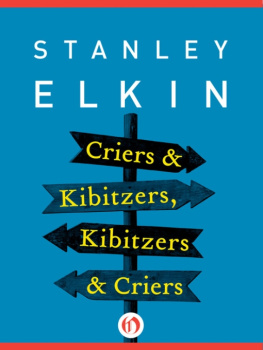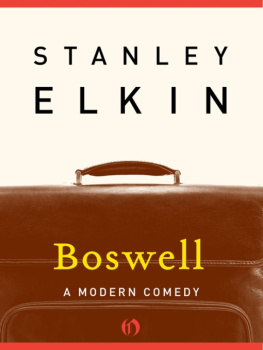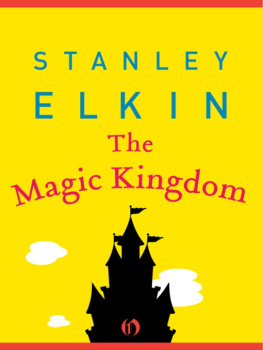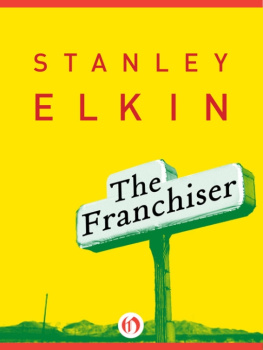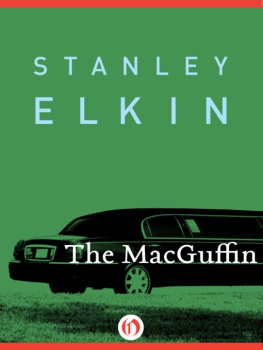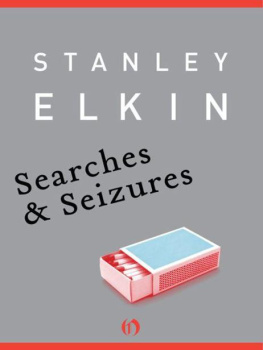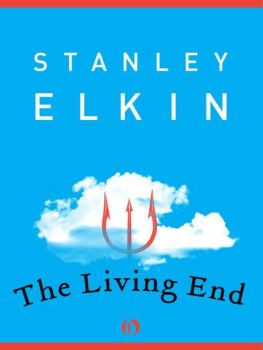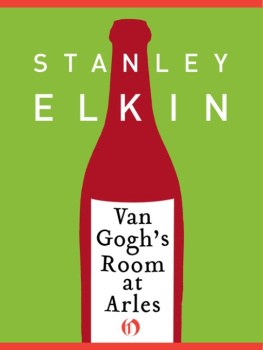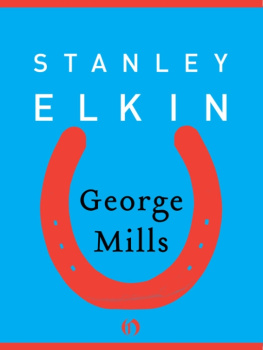Stanley Elkin - Criers & Kibitzers, Kibitzers & Criers
Here you can read online Stanley Elkin - Criers & Kibitzers, Kibitzers & Criers full text of the book (entire story) in english for free. Download pdf and epub, get meaning, cover and reviews about this ebook. year: 2000, publisher: Dalkey Archive Press, genre: Detective and thriller. Description of the work, (preface) as well as reviews are available. Best literature library LitArk.com created for fans of good reading and offers a wide selection of genres:
Romance novel
Science fiction
Adventure
Detective
Science
History
Home and family
Prose
Art
Politics
Computer
Non-fiction
Religion
Business
Children
Humor
Choose a favorite category and find really read worthwhile books. Enjoy immersion in the world of imagination, feel the emotions of the characters or learn something new for yourself, make an fascinating discovery.
- Book:Criers & Kibitzers, Kibitzers & Criers
- Author:
- Publisher:Dalkey Archive Press
- Genre:
- Year:2000
- Rating:5 / 5
- Favourites:Add to favourites
- Your mark:
- 100
- 1
- 2
- 3
- 4
- 5
Criers & Kibitzers, Kibitzers & Criers: summary, description and annotation
We offer to read an annotation, description, summary or preface (depends on what the author of the book "Criers & Kibitzers, Kibitzers & Criers" wrote himself). If you haven't found the necessary information about the book — write in the comments, we will try to find it.
Criers & Kibitzers, Kibitzers & Criers — read online for free the complete book (whole text) full work
Below is the text of the book, divided by pages. System saving the place of the last page read, allows you to conveniently read the book "Criers & Kibitzers, Kibitzers & Criers" online for free, without having to search again every time where you left off. Put a bookmark, and you can go to the page where you finished reading at any time.
Font size:
Interval:
Bookmark:
Criers & Kibitzers, Kibitzers & Criers
Stanley Elkin

For
JERRY BEATY
HERB BOGART
BOB BROWN
DAN CURLEY
DAVE DEMAREST
BILL GASS
IRWIN GOLD
BILL GUGGENHEIM
AL LEBOWITZ
KERKER QUINN
HARRY RICHMAN
GEORGE SCOUFFAS
and
JARVIS THURSTON
Contents
For reasons not in the least clear to me, Criers and Kibitzers, Kibitzers and Criers has turned out to be my most enduring work, if by enduring one refers not to a time scheme encompassing geological epochs, or, for that matter, scarcely even to calendrical ones, but to those few scant handfulstwenty-four since it was first published by Random House in hardback in 1966of years barely wide enough to gap a generation. Not counting down-time, when it was out-of-print, or the peculiar half-life when it was in that curious publishers limbo, known to the trade (but never entirely understood, at least by this prefacer) as out-of-stock, it has been in print under sundry imprimaturs (Berkley Medallion, Plume, Warner Books and, until I actually looked it up in Books in Print where I couldnt find it, I had thought Duttons Obelisk editions, and, now, Thunders Mouth Press), oh, say, eighteen or nineteen years. Set against the great timelines of history this aint, of course, muchnot in the same league with astronomys skippy-stonyd light years certainly, or even, for that matter, the same ballpark as the universe, but were talking very fragile book years, mind, which are to life span approximately what dog years are to the birthdays of humans. At a ratio of seven-to-one (seven doggie years equalling forty-nine bookie years), that would make my criers and kibitzers, depending on how the actuaries count that half-life, either eight-hundred-and-eighty-two, or nine-hundred-and-eleven-years old. A classic, antique as Methuselahthe test, as the saying goes, of time.
In additionmore new mathtwo of these stories, Criers and Kibitzers, Kibitzers and Criers and The Guest, were adapted for and produced on the stage. Criers has been a radio play on the Canadian Broadcasting System, and one, I Look Out for Ed Wolfe, was bought for the movies, though it never made the cut. (Ed Wolfe, published in Esquire in 1962, was my first mass-market sale and put me, quite literally, on the map. Well, at least on Esquires rigged 1963 chart about Americas Literary Establishment, where I found myself in shameless scarlet, short-listed among a small, arbitrary bundle of real writersrealer, in any event, than mein what that magazine deemed to be The Red Hot Center. [Just Rust Hills and Bob Brown kidding around.] It thrilled me then, it embarrasses me now. Had I had more sense it would have embarrassed me then, too. God knows it angered a lot of important critics who wrote letters to the editor, columns, even essays about it, a short-lived tempest in a tea bag not unlike the one old John Gardner provoked when he made his pronouncements about moral fiction. Not art for arts sake but hype for hypeslike the PENs and Pulitzers, NBAs and National Book Critics Circle Awards, and all those other Masterpieces of the Minute that might not last the night.) A Poetics for Bullies was recorded on an LP by Jackson Beck, the radio actor and famous voice of Bluto in the Popeye cartoons, and somewhere loose in the world is a cassette tape of The Guest which I recorded for an outfit called the Printed Word. Oh, and eight of the nine stories in C & KCousin Poor Lesley and the Lousy People is the exceptionhave been anthologized, a few of themthe Criers, Guest, Ed Wolfe and Bully storiesseveral times, almost often. Criers and Ed Wolfe were in The Best American Short Stories annuals back in the days when Martha Foley was Martha Foley. Indeed, for many years during the late sixties, the decade of the seventies, and into the eighties (its starting to fall off ), the stories have provided me and my family with a kind of widows mite, a small annuitysky money, I like to call it. (I regard myself as a serious writer, even a professional one, but deep in my heart I think of most of the money I receive from my writing as essentially unearned. This isnt, as you may suppose, a poetic wimp factor kicking inIm no art jerkso much as the hearts negotiated quid pro quo, all egos driving power trip, the rush many writers get out of their almost sybaritic wallow in the unfettered luxury of their indulged imaginations. (What, theyll pay for this? I may be a badass, but Im an honorable badass.) Anyway itthe money from the stories, all sourcesnever amounted to that much. I come cheap, after all. Maybe, top-of-the-head, all-told, thirty or thirty-five thousand dollars since 1966, my going rate for having passed the test of time. Nothing solid as a fortune, I admit, but tighter than loose changesomething like the cumulative yield on a small CD, say.
What isnt clear to me, though, is why. Why this book, why these stories? Surely Ive written better books. Surely Im a better writer now than I was when I wrote these stories. (Five of them, including the title story, one of my favorites, were written when I was still back in graduate school, for Christs sake, and only three, The Guest, A Poetics for Bullies and Perlmutter at the East Pole, were published after Id published my first novel and before Id written a second one.) So why? Why, really? Id like to know.
One thing, certainly, is the accessibility of their style and (not behind thatindeed, quite the oppositein absolute hand/ glove relationship to the relative simplicity of the style) plain speakings package deal with realism, times honored literary arrangement between ease and verisimilitude. Here, for example, is Feldman, the butcher, returning to his store after a quick trip to the bank for change for his cash drawer. (In the story, had I been a better stylist in the realistic tradition, I would have used the word silver instead of change.)
The street was quiet. It looks like a Sunday, he thought. There would be no one in the store. He saw his reflection in a window he passed and realized he had forgotten to take his apron off. It occurred to him that the apron somehow gave him the appearance of being very busy. An apron did that, he thought. Not a business suit so much. Unless there was a briefcase. A briefcase and an apron, they made you look busy. A uniform wouldnt. Soldiers didnt look busy, policemen didnt. A fireman did, but he had to have that big hat on. Schmo, a man your age walking in the street in an apron. He wondered if the vice-presidents at the bank had noticed his apron. He felt the heaviness again.
Theres something comforting, almost soothing, about realism, and its nothing to do with shocks of recognitionwell it wouldnt, would it, since shocks never consoleor even with the familiarity that breeds content, so much as with the fact that the realistic world, in literature, at least, is one that, from a certain perspective, always makes sense, even its bum deals and tragedies, inasmuch as it playseven showboats and grandstandsto our passion for reason. The realistic tradition presumes to deal, I mean, with cause and effect, with some deep need in readersin all of usfor justice, with the demand for the explicable reap/sow benefits (or punishments), with the law of just dessertswith all Gods and Natures organic bookkeeping. And since form fits and follows function, style is instructed not to make waves but merely to tag along, easy as pie, taking in everything that can be seen along the way but not much more and nothing at all of what isnt immediately available to the naked eye.
My point, then, is that the stories in Criers and Kibitzers, Kibitzers and Criers
Next pageFont size:
Interval:
Bookmark:
Similar books «Criers & Kibitzers, Kibitzers & Criers»
Look at similar books to Criers & Kibitzers, Kibitzers & Criers. We have selected literature similar in name and meaning in the hope of providing readers with more options to find new, interesting, not yet read works.
Discussion, reviews of the book Criers & Kibitzers, Kibitzers & Criers and just readers' own opinions. Leave your comments, write what you think about the work, its meaning or the main characters. Specify what exactly you liked and what you didn't like, and why you think so.

